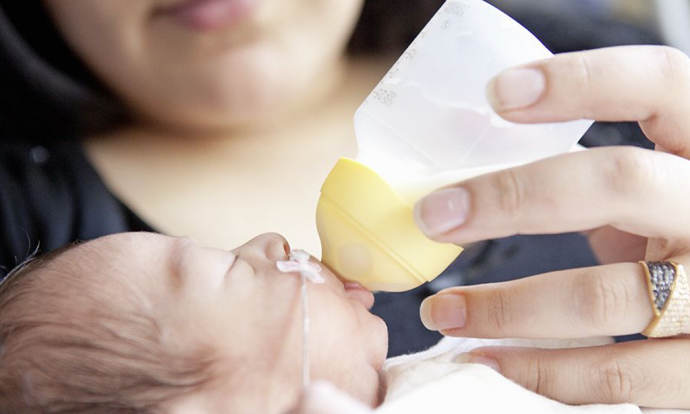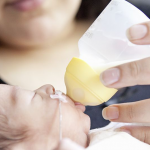Difficulties with oral feeding are a common problem in preterm infant. Failure to transition to oral feeding has been shown to slow weight gain and increase the length of hospital stay, causing stress for the family while driving up the cost of care.

Dr. Steven Barlow created and with collaboration for KCBioMedix the NTrainer System ®, is a revolutionary FDA-listed device that delivers a reliable quantitative assessment of an infant’s ability to suck , and then administers therapy to help it improve.
Research
Published Studies & Articles Supporting the NTrainer System®
as a Non-Nutritive Suck Therapeutic Device for Preemies:
Prospective Study of Non-nutritive Sucking and Feeding Skills in Premature Infants
Arch Dis Child Fetal Neonatal Ed (2010) 95:F194-F200. Bingham, P, Ashikaga,T & Abbasi, S.
Oromotor Entrainment Therapy to Develop Feeding Skills in the Preterm Infant.
Barlow SM, Poore M, & Zimmerman E. (2011). In S.S. Chabon & E.R. Cohn (Eds), The Communication Disorders Casebook: Learning by Example. Allyn & Bacon, pp. 52-62. ISBN-10: 0205610129, ISBN-13: 9780205610129
Feeding Skills in the Preterm Infant
The ASHA Leader (June 2010) 22-23. SM Barlow, MA Poore, EA Zimmerman and DS Finan
Non-Nutritive Suck Therapeutic Device for Preemies
ADVANCE for Speech-Language Pathologists & Audiologists (December 8, 2008)
Corresponding conversation between a speech-language pathologist and Dr. Steven Barlow
Synthetic orocutaneous stimulation entrains preterm infants with feeding difficulties to suck
Journal of Perinatology (2008) 28, 541-548. SM Barlow, DS Finan, J Lee and S Chu
Synthetic Orocutaneous Stimulation Entrains Suck in Preterm Infants With Feeding Difficulties
Neonatology Today (April 2008) 1-10. SM Barlow, MA Poore, EA Zimmerman and DS Finan
Patterned orocutaneous therapy improves sucking and oral feeding in preterm infants
Acta Paediatrica (2008) 97, 920-927. M Poore, E Zimmerman, SM Barlow, J Wang, F Gu
Respiratory treatment history predicts suck pattern stability in preterm infants
Journal of Neonatal Nursing (2008) 14, 185-192. M Poore, SM Barlow, J Wang, M Estep and J Lee
For additional information on Dr. Steven Barlow’s research, please visit his website
Communication Neuroscience Laboratories
Role of Non-Nutritive Suck Development – Supporting Research:(References Follow Summary)
(1 – 6) Studies indicating faster, more effective transition to oral feeding:
“Infants with a more organized suck pattern reached independent oral feeding
3 days earlier than infants with more chaotic patterns of suck burst. Measures of NNS organization and suck consistency constitute useful candidate predictors of feeding performance by premature infants. Assessment of non-nutritive sucking prior to introduction of oral feeding correlated with measures of subsequent feeding performance. Assessment of NNS maturation can predict which premature infants will experience feeding difficulty.” 1
“The experimental group received a daily 15-minute oral stimulation program… “
“…infants in the experimental group achieved full oral feedings 7 days
sooner than the control group (p=0.005)…The experimental group
demonstrated significantly greater overall intake and rate of milk
transfer at 1 to 2 oral feedings/day (p=0.01 and p=0.02 respectively).” 2
“The review identified other positive clinical outcomes of NNS: transition
from tube to bottle feeds and better bottle feeding performance.”3
“The addition of NNS accelerated the maturation of the sucking reflex,
facilitating a more rapid transition from gavage to oral feedings.” 4
“The infants provided with pacifiers averaged 27 fewer tube feedings,
started bottle feeding three days earlier, averaged a greater
weight gain per day, and were discharged eight days earlier for an
average hospital cost savings of approximately $3,500.”5
“Infants who received nonnutritive sucking before and after bottle
feedings were more likely to be in a quiescent behavior
state 5 minutes after the feeding (p = .01) and had higher feeding
performance scores (p = .01) than infants who
did not receive nonnutritive sucking.”6
(7 -8) Studies indicating more rapid weight gain
“Additionally, NNS decreased intestinal transit time and caused
a more rapid weight gain despite comparable caloric
intake resulting in a shortened hospital stay.” 7
“The infants provided with pacifiers averaged 27 fewer
tube feedings, started bottle feeding three days earlier,
averaged a greater weight gain per day, and were
discharged eight days earlier for an average hospital
cost savings of approximately $3,500.”8
(9 – 12 )Studies indicating shortened hospital stays and reduced costs
“This review found a significant decrease in length
of stay in preterm infants receiving a NNS intervention.” 9
“NNS decreased intestinal transit time and caused a more
rapid weight gain despite comparable caloric intake
resulting in a shortened hospital stay.” 10
“Meta-analyses showed that infants provided with non-nutritive sucking
had shorter hospital stays (7 d less) than infants not
provided with non-nutritive sucking..” 11
“The infants provided with pacifiers averaged 27 fewer
tube feedings, started bottle feeding three days earlier,
averaged a greater weight gain per day, and were
discharged eight days earlier for an average hospital cost
savings of approximately $3,500.” 12
References
(1 – 6) Studies indicating faster, more effective transition to oral feeding
(1.) Bingham P, Ashikaga T, Abbasi S. (2010) Prospective study of non-nutritive sucking and feeding skills in premature infants. Arch Dis Child Fetal Neonatal Ed., 95:194-200.
(2.) Fucile S, Gisel EG, Lau C. (2005) Effect of an oral stimulation program on sucking skill maturation of preterm infants. Developmental Medicine & Child Neurology, 47: 138-162.
(3.) Pinelli J, Symington A. (2005) Non-nutritive sucking for promoting physiologic stability and nutrition in preterm infants. Cochrane Database of Systematic Reviews, Issue 4. Art. No.: CD001071. DOI: .1002/14651858.CD001071.pub2.
(4.) Bernbaum J, Pereira G, Watkins J, Peckham G. (1983) Nonnutritive sucking during gavage feeding enhances growth and maturation in preterm infants. Pediatrics, Volume 71: 41 – 45.
(5.) Field T, Ignatoff E, Stringer S, Brennan J, Greenberg R, Widmayer S, Anderson G. (1982) Nonnutritive sucking during tube feedings: effects on preterm neonates in an intensive care unit. Pediatrics. Volume 70: No 3, September: 381- 384.
(6.) Pickler RH, Higgins KE, Crummette BD. (1993) The effect of nonnutritive sucking on bottle-feeding stress in preterm infants. J Obstet Gynecol Neonatal Nurs, May-Jun; 22(3): 230-4.
(7 – 8) Studies indicating more rapid weight gain
(7.) Bernbaum J, Pereira G, Watkins J, Peckham G. (1983) Nonnutritive sucking during gavage feeding enhances growth and maturation in preterm infants. Pediatrics. Volume 71: 41 – 45.
(8.) Field T, Ignatoff E, Stringer S, Brennan J, Greenberg R, Widmayer S, Anderson G. (1982) Nonnutritive sucking during tube feedings: effects on preterm neonates in an intensive care unit. Pediatrics, Volume 70: No 3, September: 381- 384.
(9 – 12) Studies indicating shortened hospital stays and reduced costs
(9.) Pinelli J, Symington A. (2005) Non-nutritive sucking for promoting physiologic stability and nutrition in preterm infants. Cochrane Database of Systematic Reviews, Issue 4. Art. No.: CD001071. DOI: .1002/14651858.CD001071.pub2.
(10.) Bernbaum J, Pereira G, Watkins J, Peckham G. (1983) Nonnutritive sucking during gavage feeding enhances growth and maturation in preterm infants. Pediatrics. Volume 71: 41 – 45.
(11.) Johnston L. (1999) Review: non-nutritive scking decreases length of hospital stay in premature infants. Evidenced-Based Nursing. Volume 2;74.
(12.) Field T, Ignatoff E, Stringer S, Brennan J, Greenberg R, Widmayer S, Anderson G. (1982)Nonnutritive sucking during tube feedings: effects on preterm neonates in an intensive care unit. Pediatrics, Volume 70: No 3, September: 381- 384.
( 13 – 17) Other Supporting References on Feeding Issues:
(13.) Comrie JD, Helm JM. (1997) Common feeding problems in the intensive care nursery: maturation, organization, evaluation, and management strategies. Semin Speech Lang. 18 (3) :239-60.
(14.) Lau C, Hurst N. (1999) Oral feeding in infants. Current Problems Pediatrics; 29: 105-124.
(15.) Jadcheria SR, Shaker R.(2001) Esophageal and upper esophageal sphincter motor function in babies. Am J Med. 111 (Suppl 8A): 648-685.
(16.) Schanler RJ, Shulman RJ, Lau C. (1999). Feeding strategies for premature infants: beneficial outcomes of feeding fortified human milk versus preterm formula. Pediatrics, 103: 1150-1157.
(17.) Wolf LS, Glass RP: (1992) Feeding and swallowing disorders in infancy: Assessment and management. Tucson, AZ: Therapy Skill Builders.




Leave Your Reply